As this March affected by COVID-19 draws to close, we approach the final days of Ramesch Daha’s exhibition I am healthy, I cannot write this letter myself. For those who can visit, don’t miss the chance to come by. The exhibition is open until Sunday 29 March.
Daha’s work traces the details of a hidden archive, which contained a secret family narrative. Retraced and researched, Daha has painstakingly reproduced the original found documents through painting and drawing. The exhibition holds space for an archive of stories, through objects, voices, what was recorded and what could not be.
More
March 2020
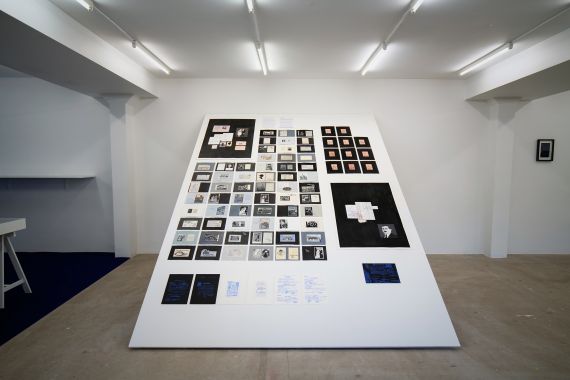
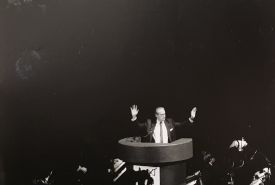 Nathalie Gabrielsson produces performances, videos, texts and installations. In 2014 she founded the research structure Kybernein Institute (KI) which investigates and exposes overlaps between policy making and cultural production.
Nathalie Gabrielsson produces performances, videos, texts and installations. In 2014 she founded the research structure Kybernein Institute (KI) which investigates and exposes overlaps between policy making and cultural production. The Campaign reconstructs a political project from 1970s Sweden, exploring how ideas formed by language, text, and image were implemented through acts of politics. Cartographic layers track how a story became a reality; how a sphere of power developed new strategies for shaping public opinion that came to change the image of the welfare society and guided politics in a new direction. More |
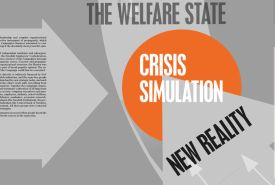 Kybernein Institute seeks collaborators for the construction of Kybernein Academy. In connection with the exhibition The Campaign, the Academy forms as a method for sharing the research material which has formed the foundation of the exhibition. This is an open invitation to students, journalists, writers, and others in related fields who wish to access, discuss and use this information from their own critical angle.
Kybernein Institute seeks collaborators for the construction of Kybernein Academy. In connection with the exhibition The Campaign, the Academy forms as a method for sharing the research material which has formed the foundation of the exhibition. This is an open invitation to students, journalists, writers, and others in related fields who wish to access, discuss and use this information from their own critical angle.Taking its departure point from the artistic position and material presented in the exhibition, the participants of the academy come together in conversation with invited guest teachers and researchers, to critically reflect on the strategies and methods exposed in The Campaign. Apply by April 12. More |
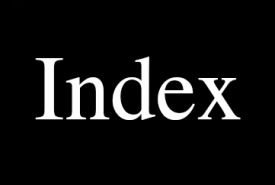 The performance artist Andrea Fraser is perhaps one of the most important figures within institutional critique. In April 2019, Fraser gave a talk at Index.
The performance artist Andrea Fraser is perhaps one of the most important figures within institutional critique. In April 2019, Fraser gave a talk at Index.To an audience in a packed out room, with windows flung wide, Fraser shared her views on power structures, the role of the artist, economy, hierarchies and mechanisms of control. Now you can listen to the talk as a podcast. “Our relationship to institutions is not that we go into them, they go into us. We incorporate them, embody them and perform them, we enact them. Their languages, their discourses, their values, their practices, their modes of perception, their systems of qualification. What Bourdieu called habitus, the social made body, the social made mind. I started to think about what I was performing as habitus. Performing the internalized institution.” – Andrea Fraser More |
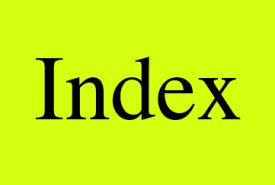 In preparation for today’s meeting, we dressed ourselves from the most jumbled part of our wardrobes. The shirt from your aunt who still looks at you like a ten year old. The garments we didn’t have the heart to throw away, because somewhere amongst them, a bit further back, our past selves still linger. The “I” at the back of the shelf.
In preparation for today’s meeting, we dressed ourselves from the most jumbled part of our wardrobes. The shirt from your aunt who still looks at you like a ten year old. The garments we didn’t have the heart to throw away, because somewhere amongst them, a bit further back, our past selves still linger. The “I” at the back of the shelf.We’re older now, and know that we shouldn’t fidget and make noise at the art museum, but the cheap leather jacket is still askew. This is how we meet. It’s safe because it is not about us, it is about someone else, and from another perspective it’s much easier to see the habits formed within an exhibition space, to see what the rules really are. We’re going to an exhibition in character. More |

This is an invitation to work alongside and within Index with an ongoing focus on forms of distribution within the arts.
The current global pandemic is unravelling myriad sequences of events, rapidly changing, in series and in parallel. This unfolding renders visible our world’s supply chains, the knock-on effects of dependency and breakdown within them. It reveals the stark truth about channels of distribution, of goods and services, and the disparity between those whose lives can continue remotely, and those who must continue amid increased precarity. What will happen after this moment of shutdown, this enforced pause? Will we collectively reassess, recognising the possibility to do things differently, the potential for real change? Or will the magnetic pull towards ‘normal’ be too strong?
Throughout the internship, Index’ exhibition space will be a shared workplace for collaboration, whilst also providing a space of reference to dig deeper into questions around distribution, and institutional structures. Apply now.
More
The current global pandemic is unravelling myriad sequences of events, rapidly changing, in series and in parallel. This unfolding renders visible our world’s supply chains, the knock-on effects of dependency and breakdown within them. It reveals the stark truth about channels of distribution, of goods and services, and the disparity between those whose lives can continue remotely, and those who must continue amid increased precarity. What will happen after this moment of shutdown, this enforced pause? Will we collectively reassess, recognising the possibility to do things differently, the potential for real change? Or will the magnetic pull towards ‘normal’ be too strong?
Throughout the internship, Index’ exhibition space will be a shared workplace for collaboration, whilst also providing a space of reference to dig deeper into questions around distribution, and institutional structures. Apply now.
More
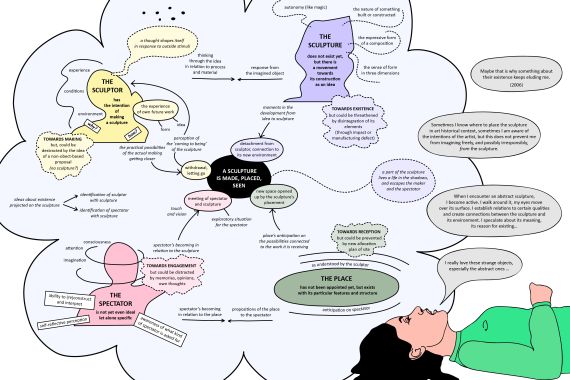
We are very happy to share the news: the artist taking part in Index Research Process program during 2020 is Falke Pisano.
The artistic practice of Falke Pisano (b. 1978, Netherlands) scrutinizes the ways in which systems of thought are structured, formalized, and ultimately naturalized. Her series of works stem from long-term research cycles that delve deep into specific subject matters and undermine conventional frameworks of knowledge by triggering a continuous exchange between language, ideas, materials, and forms. Read more and follow the process here.
More
The artistic practice of Falke Pisano (b. 1978, Netherlands) scrutinizes the ways in which systems of thought are structured, formalized, and ultimately naturalized. Her series of works stem from long-term research cycles that delve deep into specific subject matters and undermine conventional frameworks of knowledge by triggering a continuous exchange between language, ideas, materials, and forms. Read more and follow the process here.
More
Opening Hours:
Index continues to follow the government guidelines and react accordingly to prioritize the health of our visitors and team. For now we remain open but all events have been postponed. We look forward to sharing new dates for future events in due course.
Wed / Thur / Fri 12:00–18:00
Sat / Sun 12:00–16:00
Wed / Thur / Fri 12:00–18:00
Sat / Sun 12:00–16:00